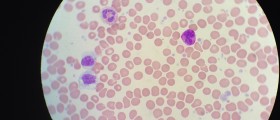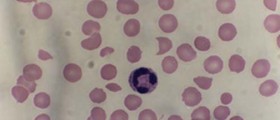
Preeclampsia, which affects five to seven percent of all pregnancies, involves hypertension, proteinuria (protein in the urine) and edema (fluid buidup, often in the extremities).
HELLP syndrome is caused by a combination of factors that lead to hemolysis, liver necrosis with elevated transaminase enzymes and thrombocytopenia or low platelets. When left untreated, HELLP syndrome can result in seizures, stroke, the rupture of the mother's liver, and a placental abruption, in which the placenta detaches from the uterine wall before the baby is born. Ultimately, HELLP syndrome can be fatal for mother and baby both, making it a medical emergency.
HELLP Syndrome: Symptoms and diagnosis
Pregnant women who have elevated liver enzymes and other elements of HELLP are likely to experience pain in the upper right quadrant or in the upper central area of the abdomen, with nausea, vomiting, malaise, fatigue and other flu-like symptoms.
The only reliable way to diagnose elevated liver enzymes is to do a specific test, checking the values of liver enzymes, in particular ALT or alanine transaminase and AST or aspartate transaminase. Elevated liver enzymes can be caused by many different problems related to the liver, such as hepatitis B or C, cirrhosis, liver cancer, alcoholism and many more, but in pregnant women the first thing doctors suspect is HELLP and preeclampsia, which is why it is necessary to also do tests checking for platelet count and hemolysis.
Treatment for elevated liver enzymes in pregnancy
As explained above, elevated liver enzymes are not a condition in itself but more a sign or a symptom of one of many possible medical conditions. The treatment for elevated liver enzymes therefore depends on the underlying cause. Sometimes, unfortunately, the underlying disease is so progressed that it cannot be cured.
In pregnant women, elevated liver enzymes are usually associated with HELLP and preeclampsia. The definitive treatment for HELLP is delivery. Until the baby is born, the mother must be closely monitored. HELLP syndrome can have a fatal outcome for the mother or the baby, or for both, which is why adequate and timely medical supervision is vital.
Depending on the severity of the case and the gestational age of the baby, doctors may decide to wait for the delivery to occur naturally or to induce it. Delivery can be induced in women who are more than 34 weeks pregnant, and in some cases, where it is considered that intervening has a better chance of a good outcome, even earlier.
However, certain precautions are necessary, especially considering the low platelet count and the fact that hypertension is often involved in this complication. In case there are indications of fetal distress, multiorgan dysfunction and kidney or liver failure, induction of labor is not recommended and cesarean section is done instead. The mother and baby will be monitored closely after the delivery as well.
- healthfinder.gov/api/Outlink/Search/http/www.preeclampsia.org/health-information/faqs?_label_=http%3A%2F%2Fwww.preeclampsia.org%2Fhealth-information%2Ffaqs
- www.nhs.uk/conditions/pregnancy-and-baby/itching-obstetric-cholestasis-pregnant/
- Photo courtesy of Julio Roman Farinas via Flickr: www.flickr.com/photos/julioromanf/26027932835/

















Your thoughts on this
Loading...